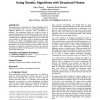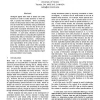4817 search results - page 880 / 964 » Learning Models of Intelligent Agents |
GECCO
2006
Springer
14 years 18 days ago
2006
Springer
This paper presents a system that uses Genetic Algorithm (GA) to evolve hierarchical pulse sets (i.e., hierarchical duration vs. amplitude matrices) for expressive music performan...
IJCAI
2003
13 years 10 months ago
2003
Intelligent agents often need to assess user utility functions in order to make decisions on their behalf, or predict their behavior. When uncertainty exists over the precise natu...
JUCS
2007
13 years 8 months ago
2007
: Most automated reasoning tasks with practical applications can be automatically reformulated into a constraint solving task. A constraint programming platform can thus act as a u...
CAINE
2010
13 years 7 months ago
2010
The ability for humans to understand and process the emotional content of speech is unsurpassed by simulated intelligent agents. Beyond the linguistic content of speech are the un...
EELC
2006
14 years 19 days ago
2006
How does a shared lexicon arise in population of agents with differing lexicons, and how can this shared lexicon be maintained over multiple generations? In order to get some insig...


